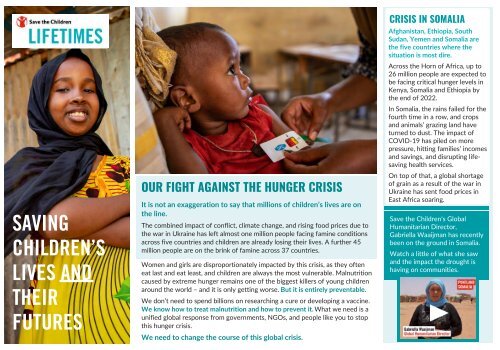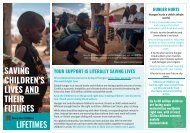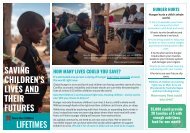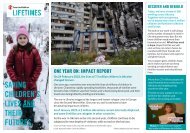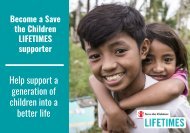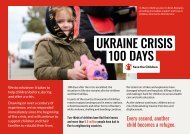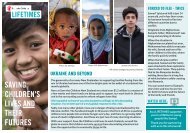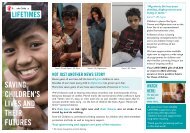LIFETIMES update 4
Save the Children's latest update for LIFETIMES supporters
Save the Children's latest update for LIFETIMES supporters
You also want an ePaper? Increase the reach of your titles
YUMPU automatically turns print PDFs into web optimized ePapers that Google loves.
SAVING<br />
CHILDREN’S<br />
LIVES AND<br />
THEIR<br />
FUTURES<br />
OUR FIGHT AGAINST THE HUNGER CRISIS<br />
It is not an exaggeration to say that millions of children’s lives are on<br />
the line.<br />
The combined impact of conflict, climate change, and rising food prices due to<br />
the war in Ukraine has left almost one million people facing famine conditions<br />
across five countries and children are already losing their lives. A further 45<br />
million people are on the brink of famine across 37 countries.<br />
Women and girls are disproportionately impacted by this crisis, as they often<br />
eat last and eat least, and children are always the most vulnerable. Malnutrition<br />
caused by extreme hunger remains one of the biggest killers of young children<br />
around the world – and it is only getting worse. . But it is entirely preventable.<br />
We don’t need to spend billions on researching a cure or developing a vaccine.<br />
We know how to treat malnutrition and how to prevent it. What we need is a<br />
unified global response from governments, NGOs, and people like you to stop<br />
this hunger crisis.<br />
We need to change the course of this global crisis.<br />
CRISIS IN SOMALIA<br />
Afghanistan, Ethiopia, South<br />
Sudan, Yemen and Somalia are<br />
the five countries where the<br />
situation is most dire.<br />
Across the Horn of Africa, up to<br />
26 million people are expected to<br />
be facing critical hunger levels in<br />
Kenya, Somalia and Ethiopia by<br />
the end of 2022.<br />
In Somalia, the rains failed for the<br />
fourth time in a row, and crops<br />
and animals’ grazing land have<br />
turned to dust. The impact of<br />
COVID-19 has piled on more<br />
pressure, hitting families’ incomes<br />
and savings, and disrupting lifesaving<br />
health services.<br />
On top of that, a global shortage<br />
of grain as a result of the war in<br />
Ukraine has sent food prices in<br />
East Africa soaring.<br />
Save the Children's Global<br />
Humanitarian Director,<br />
Gabriella Waaijman has recently<br />
been on the ground in Somalia.<br />
Watch a little of what she saw<br />
and the impact the drought is<br />
having on communities.
AN UNACCEPTABLE REALITY<br />
We recently received an email from<br />
Ebrima Saidy, Save the Children's<br />
Chief Impact Officer which<br />
describes the heart-breaking<br />
situation in Somalia so clearly.<br />
Dear colleagues,<br />
I'm emailing from Baidoa where I've been working with<br />
our team on the ground. The situation is worrying and<br />
made me angry.<br />
Our health facilities there are seeing an overwhelming<br />
increase in demand – double the usual numbers of cases –<br />
and the severity of the situation is scaring even<br />
experienced staff. The centre is full every day and they<br />
worry about resources running out.<br />
Every child brought to our health facility has diarrhea,<br />
vomiting and loss of appetite. These are the terrible early<br />
signs of their bodies failing them, the signs that within<br />
days/weeks, and without urgent interventions, many<br />
children will end up with severe complications resulting<br />
potentially in death. The ones able to reach our services<br />
are the lucky ones.<br />
This is an unacceptable reality.<br />
One woman told me she has three sick children but could<br />
only carry the most malnourished one for the 90km walk<br />
to Baidoa. She left the other two sick children in the<br />
village hoping they will be ok when she returns. These are<br />
terrible choices that no parent should be forced to make.<br />
I worked in Somalia for three years, but what I am<br />
witnessing now is potentially a cliff edge. We said that<br />
what happened in 2011 cannot happen again on our<br />
watch. If we don’t want it to happen all over again, we<br />
need a renewed sense of urgency.<br />
Sincerely<br />
Ebrima Saidy, Chief Impact Officer<br />
WE'VE STOPPED FAMINE BEFORE...<br />
During the extreme drought in East Africa in 2016, Save the Children was among the<br />
organisations who helped avert famine in Somalia.<br />
We have the experience and operations to save children's lives, treat malnutrition, and<br />
better prepare communities for future shocks.<br />
We've now prioritised 21 countries impacted by the<br />
global hunger crisis which require the most urgent action.<br />
...WE CAN DO IT AGAIN
THE HUNGER CRISIS – IT'S NOT JUST<br />
ABOUT FOOD<br />
There’s more to this story than just a lack of food. Here’s how a<br />
perfect storm of shocks has created the worst global hunger<br />
crisis in decades:<br />
CONFLICT & DISPLACEMENT<br />
While the global hunger crisis has been caused by<br />
multiple crises, conflict and displacement remain the<br />
main drivers. In 2021, more than 70% of people facing<br />
critical hunger were living in conflict-affected countries.<br />
INFLATION<br />
The war in Ukraine has accelerated what was already a<br />
catastrophic situation. With the conflict disrupting global<br />
supply chains, food supplies are shrinking while food<br />
prices are soaring.<br />
CLIMATE<br />
With the number of climate-related disasters tripling in<br />
the past 30 years, climate shocks are repeatedly<br />
decimating farming communities, driving displacement,<br />
and pushing millions into acute hunger.<br />
COVID-19<br />
Even before the war in Ukraine, the global economy and<br />
food systems were suffering from the COVID-19<br />
pandemic. In 2020, the pandemic increased the number<br />
of undernourished people globally by 132 million.<br />
LIFE-SAVING SUPPORT<br />
Reza* is 13 years old and lives with his<br />
extended family - including his sister-in-law<br />
Leila* (25) and her four children - in a single<br />
room mud home in northern Afghanistan.<br />
It's a very remote community and there is<br />
little access to clean water, health facilities<br />
or a school.<br />
Reza has never been to school and is the<br />
main breadwinner for his extended family.<br />
The community used to survive by raising<br />
livestock and growing wheat on the rolling<br />
hills, but, after years of drought, their wheat<br />
harvests have failed and families have been<br />
forced to sell their livestock because they<br />
cannot feed them.<br />
The economic crisis in Afghanistan -<br />
triggered after the Taliban regained control<br />
in 2021, and exacerbated by the current<br />
global rise in food costs - has contributed to<br />
a sharp decline in the family's income.<br />
After losing one baby last year to<br />
malnutrition, Leila's son recently received<br />
treatment at a Save the Children mobile<br />
clinic. Other support, including cash grants<br />
and truckloads of water has also been given<br />
to families.<br />
GENDER INEQUALITY<br />
Long-standing gender inequality has resulted in women<br />
being more likely to suffer from hunger. In nearly twothirds<br />
of countries around the world, women are more<br />
likely to report food insecurity.<br />
Reza*, 13, and his family received<br />
treatment at a Save the Children<br />
mobile clinic in Afghanistan.<br />
*Name changed to protect privacy<br />
Leila's son receives treatment at the mobile clinic.
CALLING ALL FOODIES!<br />
Curious to know how well you know<br />
different foods from around the<br />
world? Have a little fun by trying out<br />
our short quiz which was created for<br />
World Food Day on 16 October.<br />
A LIFESAVING TOOLKIT<br />
Our community health workers are<br />
trained to recognize severe acute<br />
malnutrition before it becomes lifethreatening.<br />
The power of our<br />
community-based approach is that<br />
early detection leads to better rates of<br />
survival for children.<br />
In 2021 alone, we helped over 10<br />
million children improve their<br />
nutrition through interventions like<br />
infant feeding and ready-to-use<br />
therapeutic foods.<br />
Click below to watch our video about<br />
how our community health workers<br />
treat severe acute malnutrition.<br />
Watch video<br />
Fatima became very sick with Severe Acute<br />
Malnutrition (S.A.M) and was treated in a hospital<br />
supported by Save the Children. She was given<br />
special milk and peanut paste to help her gain weight<br />
and recover.<br />
Today, both Fatun and Fatima are healthy and happy.<br />
“We are living in the town now. The entire family is<br />
doing great. I go to a good school and learn things.<br />
When I complete my studies, I would like to be a<br />
teacher.” Fatun<br />
Fatun* and Fatima* at home in Puntland, Somalia<br />
CHERISHING EVERY MOMENT TOGETHER<br />
Fatun*, 10, and her little sister Fatima*, four, cherish every moment together.<br />
“I play with her and make her laugh all the time. I tell her stories and she keeps<br />
laughing!” says Fatun.<br />
But things were hard for the family in 2019, when drought hit Somalia.<br />
“We had goats, but they were killed by the hot weather and the drought,”<br />
Fatun explains. The goats had been their main source of income and so the<br />
family were forced to relocate. The girls' mother, Amina opened a tea shop to<br />
replace her lost livelihood.<br />
Fatun and Fatima in 2019 after<br />
Fatima was treated for malnutrition.<br />
* Names changed to protect identity<br />
URGENT APPEAL<br />
Right now, S.A.M. is threatening<br />
the lives of 386,000 children in<br />
Somalia.<br />
With your help we can continue<br />
to support hospitals and provide<br />
life-saving care to children like<br />
two-year-old Yasmiin* who is<br />
severely malnourished. Save the<br />
Children staff recently met<br />
Yasmiin and her mother, Astur*<br />
at the displacement camp on<br />
the outskirts of Baidoa. They<br />
immediately assessed Yasmiin,<br />
diagnosed her with malnutrition<br />
and referred her to Save the<br />
Children’s stabilisation centre<br />
where she is receiving<br />
treatment.<br />
Astur* recently lost her 4-yearold<br />
daughter to measles. Save<br />
the Children’s medical team said<br />
without intervention Yasmiin<br />
would only have survived a<br />
week but she is now expected<br />
to make a full recovery.<br />
If you'd like to change the<br />
future of children like Yasmiin,<br />
I'd love to hear from you.<br />
mandy.carian@scnz.org.nz<br />
ph: 04 381 7572<br />
Thank you for your wonderfully<br />
generous support which is<br />
helping children to not only<br />
survive, but to move forward<br />
into a more positive future.


